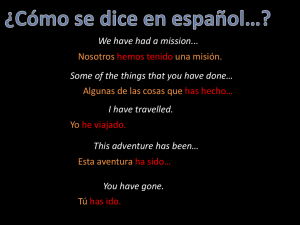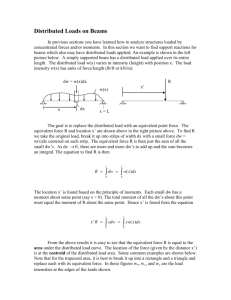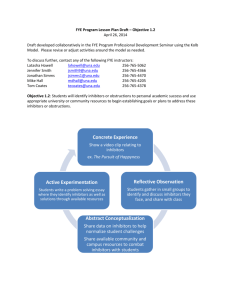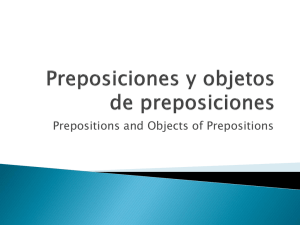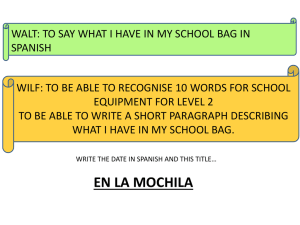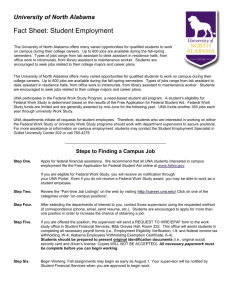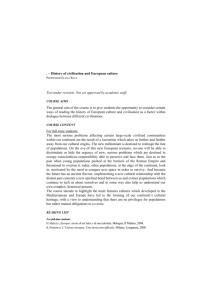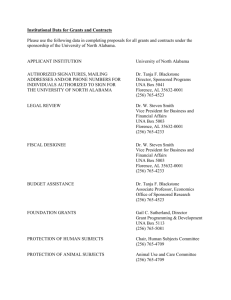SPAN 4671
advertisement
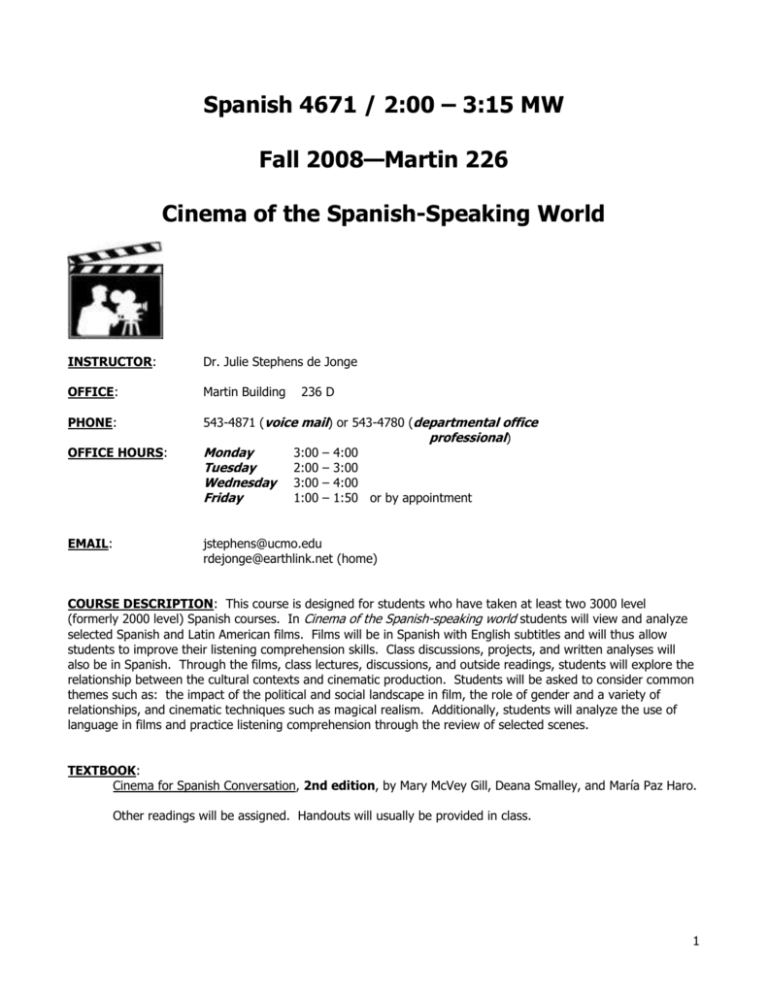
Spanish 4671 / 2:00 – 3:15 MW Fall 2008—Martin 226 Cinema of the Spanish-Speaking World INSTRUCTOR: Dr. Julie Stephens de Jonge OFFICE: Martin Building PHONE: 543-4871 (voice mail) or 543-4780 (departmental office professional) Monday 3:00 – 4:00 Tuesday 2:00 – 3:00 Wednesday 3:00 – 4:00 Friday 1:00 – 1:50 or by appointment OFFICE HOURS: EMAIL: 236 D jstephens@ucmo.edu rdejonge@earthlink.net (home) COURSE DESCRIPTION: This course is designed for students who have taken at least two 3000 level (formerly 2000 level) Spanish courses. In Cinema of the Spanish-speaking world students will view and analyze selected Spanish and Latin American films. Films will be in Spanish with English subtitles and will thus allow students to improve their listening comprehension skills. Class discussions, projects, and written analyses will also be in Spanish. Through the films, class lectures, discussions, and outside readings, students will explore the relationship between the cultural contexts and cinematic production. Students will be asked to consider common themes such as: the impact of the political and social landscape in film, the role of gender and a variety of relationships, and cinematic techniques such as magical realism. Additionally, students will analyze the use of language in films and practice listening comprehension through the review of selected scenes. TEXTBOOK: Cinema for Spanish Conversation, 2nd edition, by Mary McVey Gill, Deana Smalley, and María Paz Haro. Other readings will be assigned. Handouts will usually be provided in class. 1 GRADING SCALE 90-100 = 80-89 = 70-79 = A B C 60- 69 = 0 - 59 = D F EVALUATION: Students’ final grades will be based on the following percentages: Análisis Cinematográficos (6) ---------------- 25% Vocabulary Quizzes --------------------------- 15% Outside Film ----------------------------------20% (Presentation 5%+ written paper 10%) In-class writing --------------------------------- 10% Homework -------------------------------------- 20% Final Exam -------------------------------------- 10% ATTENDANCE: Students are responsible for all information and handouts given during class (including films). If you miss a day we view a film (we will only watch two films in class), it is your responsibility to make sure you view the entire film. You should not rely on your classmates' summary of the film. Work done for credit in class cannot be made up. LATE WORK: Work is due by 5:00 pm on the due date. You may send an assignment to me by email to avoid having it counted as late. Please bring a hard copy of the assignment the next class period. I cannot print the assignment for you nor grade it until I have a hard copy. Late work may only be accepted at my discretion with a documented excuse . FILM CONTENT: The films deal with a variety of topics. Students should be aware that the films may deal with topics considered controversial by some and may include violence, sexual content, and language considered offensive by some individuals. See pages vi and vii of the preface regarding the selection of films for the book. FILM VIEWING: You will need to view MOST of the films outside of class. Some are available in the library for you to check out and watch in one of the viewing rooms. Most will also be available for check out from the department on an assigned date. See separate sheet for schedule. The calendar at the end of the syllabus lets you know by which date you need to have seen the film. The due date for each film is the first day it appears on the calendar. You can work ahead but if you watch a film that we will not discuss for several weeks, be sure to take notes. 2 ANÁLISIS CINEMATOGRÁFICO For six films you will respond to a series of questions and explain ideas and other aspects about the film. There is a form to follow. There are seven due dates on the calendar but you only have to do six. See handout for additional information. VOCABULARY QUIZZES Each chapter in the book has two vocabulary lists. You will do homework related to the vocabulary and will have short quizzes over the vocabulary every 2-3 weeks. See calendar for dates. The lowest score will be dropped. Make-up quizzes may only be given at my discretion with a documented excuse. If you miss a class the day of a quiz, it will count as your dropped quiz. OUTSIDE FILM PRESENTATION AND PAPER Select a film whose original dialogue and narration was in Spanish and do a presentation and write a paper on it. You may do the presentation alone or in pairs. See handout for additional information. IN-CLASS WRITING In some classes you will write a written response to a discussion question. This will give you a minute to think about your response and formulate your ideas before we talk in class. I will call on some students to read their response. These responses will be collected at the end of the class and you will receive points for doing them. They cannot be made up if you miss class. During presentations, you should write down two or three questions to ask the presenter. I will ask several students to read their questions during the question/answer period after the presentation. You will turn those questions in for credit. They cannot be made up if you miss class. HOMEWORK Homework is assigned usually from the textbook. Assignments from the textbook are given on the calendar below. Please type and double space all assignments. Other assignments include readings and blackboard surveys. Your answers to the blackboard surveys are anonymous but it will record that you have completed the survey. Surveys over a particular film are due the first day of discussion over that film. Do all the vocabulary exercises for each film. Many serve to expand and strengthen your vocabulary while others relate to the themes in the film. You will not be asked to turn those exercises in, but rather to come prepared to review them in class. Type all assignments done outside of class. 3 FINAL EXAM: The final will be a take-home exam and will contain a variety of questions and written activities that ask students to identify compare and contrast the films viewed over the semester and the films presented by other students in outside presentations. You may be asked to identify cultural, political, and social forces that have shaped the films, do exercises related to vocabulary and grammar covered, comment on the six readings, and synthesize different types of information about the films and their cultural contexts. Exam sections may include mutliple choice questions, questions requiring short answers, and questions requiring essays. DUE Wednesday, December 10h: The final exam is scheduled for Monday, Dec. 8th. But, it will be a takehome exam and you can work on it up until Wednesday the 13th). Assessment exam for graduating seniors: If you are completing a major in Spanish and this is your last course, please see Dr. Merrill immediately to arrange a senior exit exam. REQUIRED FILMS: Todos somos estrellas El norte Como agua para chocolate Hombres armados De eso no se habla La historia oficial María llena eres de gracia Diarios de motocicleta Fresa y chocolate Guantanamera Belle Epoque ¡Ay Carmela! Mujeres al borde de un ataque de nervios Todo sobre mi madre Mar adentro USEFUL PHRASES FOR DISCUSSION: A mí me parece que . . . Lo que más me llamó la atención era . . . . . . me llamó la atención En mi opinion . . . A mi parecer . . . Yo creo / yo pienso Yo me fijé en (I noticed) No comprendí . . . Me gustó . . . Era interesante. . . El aspecto más importante, más interesante, más extraño… La película se trata de (deals with) . . . El principio de la película (The beginning of the film) 4 El final de la película (The end of the film) ¿Qué te pareció . . .? ¿Qué pensaron ustedes de . . .? ¿Cuál es el . . . más . . .? Si ustedes fueran este personaje, ¿qué harían? Si ustedes estuvieran en esta situación, ¿qué harían? EXTRA CREDIT OPPORTUNITY! MAKE YOUR OWN MOVIE! For extra credit, consider making your own short film in Spanish using a digital video camera, an iMac and the iLife software, which includes movie editing software. The equipment can be checked out from the department. I encourage you to utilize your language skills and your creativity to create a film to show to the class and possibly at our spring foreign language day film festival for junior high and high school students. You could write a script, be a director, act in the film or play more than one role in the creation of the film. Think about possibilities and talk to me about the details. You might decide to work alone or in a small group in the class. The amount of extra credit will depend on the number of people involved in the project and the nature of the project. It will NOT be more than 10% added to the final grade. CQIP and General Education Goals A. Communicating 1. Students will develop their oral communication in both “everyday” and “idea-centered” conversational Spanish. “Oral communication” does not mean perfection, but rather an increased ability to convey the speaker’s message in the foreign language. 2. Students will be able to understand and ask basic questions, and make several statements related to the topics covered in the textbook or a film. 3. Students will expand their vocabulary on a variety of intermediate and advanced level topics 4. Students will develop their reading proficiency. 5. Students will develop their writing skills by writing journals about themselves and their activities. 6. Students will develop their speaking abilities by participating in class activities. B. Valuing 1. Students will demonstrate an awareness of the cultural values of other communities by reading the cultural information provided in the textbook or films. 2. Students will be introduced to some of the ways those living in other societies fulfill their needs, be they educational, social or cultural. C. Humanities and Fine Arts Students will understand the historical, linguistic and cultural contexts and expressions of the peoples where the target language is spoken, within the limits of the textbook and other materials introduced. 5 ACTFL/NCATE This course will address the following standards: Standard 1: Language, Linguistics and Comparisons Standard 2: Cultures, Literatures, Cross-Disciplinary Concepts Academic Integrity: Please refer to the Honesty Policy on pages 142-145 of the UCM Student Planner/Handbook regarding University policy on cheating. Any violation of that policy will result in an “F” in the course and, possibly, suspension. Academic Honesty Policy Statement Honesty- Honesty in all endeavors is essential to the function of society. Honesty in the classroom among students and between students and faculty is one of the most important qualities influencing the character and image of an educational institution. As higher education is challenged to improve the quality of its programs, there is great value in emphasizing academic standards and integrity. Plagiarism – Plagiarism is defined as the borrowing of ideas, opinions, examples, key words, phrases, sentences, paragraphs, or even structure from another person’s work, including work written or produced by others without proper acknowledgement. “Work” is defined as theses, drafts, completed essays, examinations, quizzes, projects, assignments, presentations, or any other form of communication, be it on the Internet or in any other medium or media. “Proper acknowledgement” is defined as the use of quotation marks or indenting plus documentation for directly quoted work and specific, clearly articulated citation for paraphrased or otherwise borrowed material (paraphrased from the Student Handbook, 2002). Cheating – includes but is not limited to those activities where a student: Obtains or attempts to obtain preknowledge of content of an examination; Copies someone else’s work, including lesson plans straight from the Internet or other source Works in a group when student has been told to work individually; Uses unauthorized reference material in an examination; Has someone else take an examination; Uses own work from one class for requirements for another class It is the University’s responsibility to provide an educational process that informs both students and faculty of their rights and responsibilities regarding such important matters as cheating, plagiarism, and professional ethics. Most of what is considered unethical or dishonest behavior can be avoided if faculty and student clearly understand both what constitutes these practices and their consequences. The University community should also be aware of the procedures to be followed should a breach of academic honesty occur. Students who need accommodation: This course works in concert with the Office of accessibility Services and the Office of Equity in meeting ADA requirements. The Office of Accessibility Services (OAS) provides accommodations to Central students with disabilities as defined by the ADA. Students must provide appropriate verification of their disabilities. Call 660- 6 543-4730 or visit OAS in 220 of Union. This instructor will make reasonable accommodations based on recommendations from OAS. Early Alert: As part of the Department of Modern Languages commitment to building a positive, student-centered learning community that supports the success of every student, the faculty member instructing this course participates in the UCM Early Alert Program. Keep this question in mind as view and think about the films . . . How does this film illuminate the human experience / the human condition? CALENDARIO TENTATIVO otoño 2008 AC=Análisis cinematográfico: There are 7 different assignments and due dates but you only have to turn in 6 ACs. Keep the numbering provided on the calendar. If you skip AC #5, AC # 6 would be your 5th analisis, but label it AC #6. agosto lunes 25 Todos somos estrellas martes 19 26 Ver en clase miércoles 20 Introducción al curso 27 Todos somos estrellas jueves 21 viernes 22 28 29 Ver en clase Entregar tarea: p. 77 A & B p. 79 A (escoger a dos personajes) p. 80 A p. 81 B p. 82 (escoger un tema y escriba una respuesta de al menos 50 palabras) septiembre lunes 1 NO HAY CLASES Labor Day, ¡Que descansen! martes 2 miércoles 3 Hombres armados jueves 4 viernes 5 Entregar tarea: p. 3 A & B p. 4, Antes de ver la película, (escoger una pregunta y responda con un mínimo de 50 palabras) p. 7 A & B p. 9 (escoger un tema y escriba una respuesta de un mínimo de 50 palabras) 7 8 Hombres armados y Como agua para chocolate 9 Entregar tarea: p. 19 A & B p. 20, A, #1 p. 22-3, A p. 23, B p. 23-5 ((escoger un tema y escriba una respuesta de un mínimo de 50 palabras) 22 Presentación sobre El espíritu de la colmena, Pam Glasnapp 12 16 17 El norte (ver en clase) 18 19 23 24 De eso no se habla (mirar en clase) 25 26 Entregar tarea: p. 105-6, A, B, & C p. 106, A (escoger una pregunta) p. 109-110, A & B p. 111-112 (escoger un tema y escriba una respuesta de un mínimo de 50 palabras) AC # 2: Como agua para chocolate o El norte 29 Terminar De eso no se habla 11 Prueba de vocabulario # 1 Entregar tarea: p. 33 A & B p. 34, A or B p. 36-7, A, B & C p. 38 (escoger un tema y escriba una respuesta de un mínimo de 50 palabras) AC # 1: Todos somos estrellas o Hombres armados 15 El norte (ver en clase) 10 Como agua para chocolate 30 Prueba de vocabulario # 2 8 octubre lunes 6 Diarios de motocicleta martes miércoles 1 María, llena eres de gracia Entregar tarea: p. 63 A p. 64 B p. 64, A, B, or C p. 65, A (escoger una pregunta) p. 66, A, B, C p. 68-69 (escoger un tema y escriba una respuesta de un mínimo de 50 palabras) 8 María y Diarios (continuar) 7 jueves 2 3 viernes 9 10 16 17 23 24 30 31 Entregar tarea: p. 89-90 A, B, & C p. 90, A (escoger una pregunta) p. 94-95, A, B, C p. 23, B p. 96 (escoger un tema y escriba una respuesta de un mínimo de 50 palabras) AC # 3: De eso no se habla o María, llena eres de gracia 13 La historia oficial 14 15 Presentaciones Entregar tarea: p. 121 A y B p. 122, A (escoger una pregunta) p. 125, A, B p. 126-7 (escoger un tema y escriba una respuesta de un mínimo de 50 palabras) AC # 4: Diarios de motocicleta o La historia oficial Prueba de vocabulario # 3 20 Fresa y chocolate Entregar tarea: p. 155-6 A, B, & C p. 157, A & B (todo) p. 160-1, A & B p. 162 (escoger un tema y escriba una respuesta de un mínimo de 50 palabras) 27 Presentaciones 21 22 Guantanamera Entregar tarea: p. 173 A, B, & C p. 174, A (escoger una pregunta) p. 176, A & B p. 177-8 (escoger un tema y escriba una respuesta de un mínimo de 50 palabras) 28 29 Presentaciones AC # 5: Fresa y chocolate o Guantanamera 9 noviembre lunes 3 Presentaciones martes 4 miércoles 5 Belle Epoque jueves viernes 6 7 13 14 20 21 27 Vacaciones 28 Vacaciones Entregar tarea: p. 105-6 A & B p. 206, A (escoger una pregunta) p. 209, A & B p. 210 (escoger un tema y escriba una respuesta de un mínimo de 50 palabras) 10 ¡Ay Carmela! Prueba de vocabulario # 4 12 Mujeres al borde de un ataque de nervios 11 Entregar tarea: p. 219-220 A & B p. 220, A (escoger una pregunta; si no conoce a nadie, imagínese como sería la experiencia) p. 222, A & B p. 223 (escoger un tema y escriba una respuesta de un mínimo de 50 palabras) 17 Presentaciones Entregar tarea: (selected exercises are slightly different) p. 234 A & B p. 234 A (escoger una pregunta) p. 238-9, A, B, C p. 239, B #s 2, 3, 4 18 19 Todo sobre mi madre AC # 6: Belle Epoque o ¡Ay Carmela! Entregar tarea: p. 247 A, B, C p. 248, A (escoger una pregunta) p. 250-1, A & B p. 252 (escoger un tema y escriba una respuesta de un mínimo de 50 palabras) Entregar trabajo sobre tu película. 24 Vacaciones de Thanksgiving 25 Vacaciones Prueba de vocabulario # 5 26 Vacaciones de Thanksgiving diciembre lunes 1 Mar adentro martes 2 Prueba de vocabulario # 5 Entregar tarea: p. 261-2 A, B, C p. 262, A (escoger una pregunta, si no conoce a nadie, imagínese cómo sería la experiencia) p. 265-6, A, B, C p. 266-7 (escoger un tema y escriba una respuesta de un mínimo de 50 palabras) 8 miércoles 3 Discusión final jueves viernes 4 5 11 12 AC # 7: Todo sobre mi madre o Mar adentro 9 10 Entregar examen final para las 10 5:00 hoy. 11
